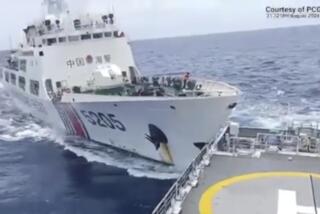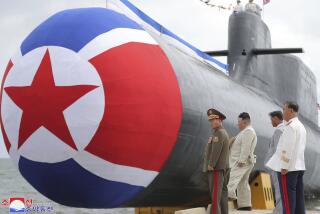China Regrets Sub Incident, Japan Says
- Share via
BEIJING — China expressed regret through diplomatic channels Tuesday that one of its nuclear-powered submarines intruded into Japanese territorial waters last week for “technical reasons,” Japanese officials said.
The apparent Chinese admission followed growing pressure from Tokyo to own up to the incident, which is expected to worsen already tense Sino-Japanese relations. Japanese officials had hinted that they might impose trade sanctions and rule out a possible summit between their leaders if China didn’t apologize.
“China got its fingers burned,” said Jean-Pierre Cabestan, a China expert at the French National Center for Scientific Research in Paris. “It had no choice but to send a rather mild form of apology.”
Beijing remained publicly low-key Tuesday about the incident. A spokeswoman refused to confirm that China had apologized or even that the submarine belonged to China.
This was at odds with the word from Japan. “China has said it regrets the incident and will carry on its policy of partnership with Japan unchanged,” Japanese Foreign Minister Nobutaka Machimura told reporters in Tokyo, relaying a message given to Japan’s ambassador in Beijing.
The submarine, reportedly a Han class model, was spotted in Japanese waters off Okinawa on Nov. 10. Japan gave chase with destroyers and a patrol plane as the sub zigzagged toward China, passing the contested Diaoyutai islands, known as the Senkaku in Japan.
On Friday, after concluding that the vessel was Chinese, Tokyo demanded an apology. China initially denied that the ship was one of its own, then said it would investigate the issue, Japanese officials said.
Experts said it was possible that the Chinese vessel had strayed off course. But it was more likely, they said, that the sub was on a reconnaissance mission. The waters where it was spotted are politically and militarily sensitive, because they contain resources claimed by both countries and are near Taiwan.
China has made no secret of its intention to attack Taiwan if the island declares independence and has been building up its naval, technological and command-and-control systems to that end. Beijing considers Taiwan a Chinese province. The two split in 1949 after a civil war.
“It was probably there to probe the future battlefield and enhance preparations militarily in case Taiwan declared independence,” said Ni Lexiong, a military expert with Shanghai’s East China University of Science and Technology. “It was meant to hint at our seriousness on the Taiwan issue and show Japan and America our decisiveness should they consider interfering.”
If the submarine was trying to test U.S. and Japanese military readiness, however, China may have gotten more than it bargained for. The Japanese navy scrambled quickly, its first major mobilization in years. And Japan directly and publicly challenged China, a break with its past practice of avoiding confrontation.
The political damage could take far longer to dissipate than the military tension, given Japan’s growing suspicion of China’s intentions and political calls for a tougher stance against Beijing.
As China has become stronger economically and militarily, Beijing has sought to portray its growing power as a “peaceful rise.” But Japan’s increasing wariness could undermine that message, pushing Tokyo to spend more on defense and nudging it closer militarily to the United States.
The sub incursion is the latest in a series of incidents that have spurred mutual distrust. Japanese Prime Minister Junichiro Koizumi’s visits to a Tokyo shrine honoring the nation’s fallen soldiers -- including some condemned war criminals -- have angered Beijing. China’s recent drilling for gas in a disputed area between the two countries has rattled Japan. And the long-standing rift over the disputed Diaoyutai-Senkaku islands has also intensified.
“This submarine incident comes with China-Japan relations at their worst phase in recent memory,” said Tomoyoshi Kanamaru of the East Asia Research Institute, a Tokyo think tank.
The sub incident also threatens to undermine China’s standing among Taiwanese in advance of the island’s Dec. 11 legislative elections. Some see it as bolstering support for political allies of Taiwanese President Chen Shui-bian, who favors a tougher line toward Beijing. And it could strengthen ties between Taiwan and Japan; Japan posted a military attache to Taipei a few months ago, its first since the 1970s.
But Beijing and Tokyo both have an interest in defusing tensions as quickly as possible.
“If this can’t be settled smoothly, it will provoke Japan and Japanese nationalists against China,” said Andrew Yang, a military expert with Taiwan’s Chinese Council of Advanced Policy Studies. “That’s no good for China, and no good for Japan.”
Analysts said one of the main lessons from the sub incident was the need for better communication among armed forces operating in Northeast Asia to avoid having a small incident trigger a crisis.
“There’s a real need for an upgrading of military exchanges and dialogue,” Yang said.
Hisako Ueno of The Times’ Tokyo Bureau and Yin Lijin of the Beijing Bureau contributed to this report.
More to Read
Sign up for Essential California
The most important California stories and recommendations in your inbox every morning.
You may occasionally receive promotional content from the Los Angeles Times.













